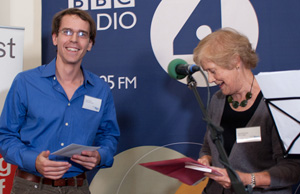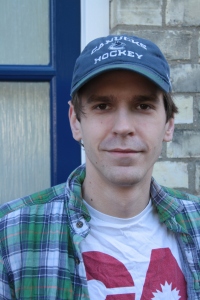Remember this aside from my “Masterclass”? (Hmm, University of East Anglia rings a bell. Ah yes, that’s where the Canadian who won the BBC short story competition was studying. Who was he?)
Well, I found him, and met him in Cambridge. He goes by D. W. Wilson and he did indeed win the BBC National Short Story Award in 2011 for his story, “The Dead Roads.” Wilson’s first collection of stories, Once You Break a Knuckle, was originally published by Hamish Hamilton Canada/Penguin Group, and is being released in the UK by Bloomsbury on April 12, 2012.
How did a young writer from Invermere B.C. end up here, teaching writing to the English? Before the Atlantic ocean turns green with the envy of stay-at-home (SAM) writers, let me back up a bit. Dave Wilson grew up in the small towns of the Kootenay Valley (his father is in the RCMP) and left Lake Windermere behind to study creative writing and philosophy for his BA at the University of Victoria. (Wilson: “UVic makes good writers.”) Encouraged to pursue post‑graduate studies by his teacher, Lorna Jackson, he applied to the Creative Writing MA programme at the University of East Anglia. He was able to fund this further study in part because the university awarded him the inaugural annual UEA Booker scholarship in 2009.
The UEA Booker scholarship is jointly funded by the University of East Anglia and the Booker Prize Foundation and is open to graduates from all Commonwealth countries and Ireland. The award covers academic fees, travel and living costs and is given to a student admitted to the prose fiction strand of the Creative Writing MA programme.
Wilson finished his MA in 2010 and is now doing a Creative and Critical Writing PhD in the School of Literature, Drama and Creative Writing at the University of East Anglia. That is also where he teaches, which he loves doing. His second book, the novel Ballistics, is forthcoming with Penguin and then with Bloomsbury in the UK next spring.
His first book has already been shortlisted for the BC Book Prizes and longlisted for the Frank O’Connor International Short Story Award. Wilson was 26 when his story won the BBC National Short Story Award in 2011, and this small fact has been much promoted as the prize’s “youngest ever winner.”
Has it gone to his head? I would say not. While we talked over coffee in Cambridge, I thought he’d get on well with the BC part of my family – not just because of his plaid shirt and Canucks cap. Funny and modest, he talked about his redneck image and that his friends in the UK call him a lumberjack. The downside of this image is that some of his work has been rejected as being “too Canadian.”
I asked if being awarded an “inaugural” scholarship made him feel under pressure to produce. He said it wasn’t pressure really, but that he felt an obligation, a responsibility to read and edit closely the manuscripts of others in the writing workshop. Although he was awarded the UEA Booker scholarship three years ago, it still brings attention to his work. He smiles, “I’m very lucky.”
That’s when I’m supposed to say, No no, all your hard work paid off etc., but I’ll leave that for when I review his collection. Right now, though, I can say that he was most animated when talking about sentences. Each sentence must be right before he moves on to the next. “The sentence and words, if strong enough, can make the story.” He also had interesting things to say about the differences between UK and North American literary experimentalism: form in the UK vs. voice and lyricism. “In Canada content dictates form but here it is the opposite.”
And what about living and working abroad, how is that going? He is most comfortable writing away from home, and even here in the UK he prefers public places to his small shared apartment. Yes, he does try to keep up with the news by the CBC website, and yes, he misses summer in BC, and yes, he is identified as “of Invermere B.C.” as a finalist for Canada Writes (CBC Short Story Prize). All the same, he says he would like to stay abroad for a while longer – he’ll go back to Canada someday but not right away. He finishes his PhD next October. He is managing to make a living from his writing and would like to continue to do so. “I could live anywhere.” Asked if he would write about England, he said, “I can’t write about where I am.” The next few months include a busy travel schedule: France, Italy, University of Victoria, and Cork.
Wilson sees his time abroad as positive for his work:
“I think living in London and having a UK agent gave my work a certain element of “exoticism” – though not exactly that. Maybe “otherness”? I just wonder – and there’s no way to test this – if my work would’ve had the same reception had I been in B.C. or even in the U.S.”
Related articles
- D.W. Wilson Takes the Magic 8, Canada Writes.(cbc.ca)
- Listen to Wilson on CBC’s North by Northwest.(cbc.ca)
- Listen to Wilson give advice on short story writing here.(www.commonwealthwriters.org)
- Or click here to read his essay on voice in the White Review. (whitereview.org)
- Read CWA’s review of his collection of short stories (canadianwritersabroad.com)

Columbia Ground Squirrel making its spring appearance, Friends of Kootenay, photo by Larry Halverson
It should be easy to choose a closing photo of scenery in the mountain valleys of British Columbia. But what to choose? The avalanche, the deer cull, the ice rink that competes with Ottawa’s, the new ski resort on Jumbo Glacier? So I went with a photo of something every Canadian looks forward to as winter slides into spring.


Nice to see the Wilmer dinner jacket, and hopefully the nucks will win it this year.
LikeLike